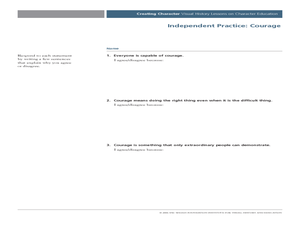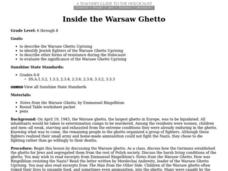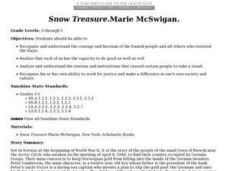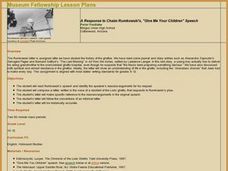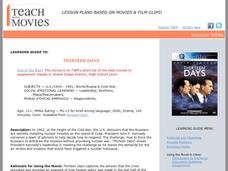Curated OER
Stand Firm: Choice and Consequences
Students explore the Holocaust. In this world history lesson plan, students research Nazi oppression under Hitler's rule as they read Holocaust and Human Behavior and Facing the Lion: Memoirs of a Young Girl in Nazi Europe.
Curated OER
Chiune Sugihara, Living by Gandhian Principles
Seventh graders read about Chiune Sugihara and analyze the moral situations he faced. In this morality lesson, 7th graders read chapters from A Special Fate, Chiune Sugihara: Hero of the Holocaust and analyze his moral decisions in the...
Curated OER
Number the Stars
Fifth graders examine threat to all people (particularly the Jews) resulting from the imposition of Nazi authority, and appreciate the courage exhibited by ordinary people acting out of conscience.
Curated OER
Creating Character: Courage
Students explore the concept of courage, both in themselves and in others. In this history and character education lesson, students discuss the characteristics of courage and what it means and how one can show it. Students listen to...
Curated OER
Holocaust
Seventh graders explore the geography of Eastern and Western Europe. They compare and constrast the culture of Jewish people from Eastern and Western Europe. They analyze deportation and confinement in concentration camps, using personal...
Curated OER
Inside the Warsaw Ghetto
Students describe the Warsaw Ghetto Uprising and identify Jewish fighters of the Warsaw Ghetto Uprising. They describe other forms of resistance during the Holocaust. They evaluate the significance of the Warsaw Ghetto Uprising.
Curated OER
Fighting Back
Students identify different methods of resistance used by Jews during the Holocaust and classify them as either passive or active forms of resistance. They create a role play of a husband and wife on whether they should hide a child of...
Curated OER
Snow Treasure: Marie McSwigan
Students read and discuss Snow Treasure by Marie McSwigan.
Echoes & Reflections
The Ghettos
Young historians examine primary sources, including diaries, poems, and photographs, to consider the conditions in the ghettos and how they fit into the escalation of the Third Reich's plot against the Jewish people.
Echoes & Reflections
The "Final Solution"
Nazi policies shifted from deportation and imprisonment to extermination of the Jewish people in death camps in the "Final Solution." Learners examine photos of artifacts, read poetry written by survivors, analyze testimony from...
Curated OER
Freedom from Oppression
Students investigate instances of genocide and role play as reporters writing news stories and editorials.
Facing History and Ourselves
Do You Take the Oath?
Why did so many go along with Nazi policies during World War II? An investigatory unit includes four handouts, reading analyses, classroom discussion topics, and intriguing philosophical questions, helping learners understand the...
Curated OER
Forgotten Daughters
Learners research gender oppression in Nazi Germany and organize and develop presentations. They identify patriarchal and Fascist policies in Nazi Germany.
Curated OER
A Response to Chaim Rumkowski's, "Give Me Your Children" Speech
Learners examine the history of the ghettos and read Rumkowski's letter. Using journal and diary entries, they identify types of resistance used during the Holocaust. Writing a letter, they use references to Rumkowski's original letter...
Curated OER
Walk a Quote: A Lesson Based Upon the Sugihara Story
Tenth graders gather information on the history of anti-Semitism and Judaism. Using texts from a variety of sources, they analyze the role of rescue and resistance in children's books. They discuss the child's point of view and reflect...
Curated OER
Anne Frank: Courage and Responsibility
Sixth graders explore, examine and trace the development of modern Europe from 1900 to the present. They identify and assess the attitudes during this time period toward discrimination and become more aware of their sensitivity to...
Curated OER
Anne Frank: Courage and Responsibility
Sixth graders examine attitudes toward discrimination. They increase their sensitivity to diversity. After a lecture/demo, 6th graders read about people who exhibit courage and complete a writing assignment about them.
Curated OER
It Can't Happen Here or Can It?: Peer Pressure, Prejudice and Intolerance
Students examine the pressures of group-pressured behavior. For this teaching tolerance lesson, students read literature and view videos regarding negative group behavior. Students answer comprehension questions and participate in a survey.
Curated OER
Bible--Anti-Semitism
Learners define anti-Semitism and list reasons that Hitler believed Jews were the most inferior race. In this anti-Semitism lesson, students discuss anti-Semitism and search a website to find reasons Hitler and others give for their...
Teach with Movies
Learning Guide to Thirteen Days
While Thirteen Days is a fantastic film to use in the classroom in reference to the Cold War and the Cuban missile crisis, it is important to take care to effectively and properly incorporate its contents into your curriculum. This...
Curated OER
Headlines
Learners analyze how newspapers report the news and compare the events that they now know about World War II as compared to what was publicized back then.
Bright Hub Education
Introducing "Number the Stars"
Prepare your class to read Number the Stars, by Lois Lowry, with these prereading activities. This resource lists three ideas to ready your readers. Learners explore the historical context, connect to the book, and preview the book....
Curated OER
"When They Came for Me, There Was No One Left to Speak Up" - Exploring Personal and Collective Responsibility in WWII
Students examine the underlying meaning of the phrase spoken by Pastor Martin Niemoller in 1945, "When they came for me, there was no one left to speak up." In this World History lesson, students share in a class discussion on civic and...





